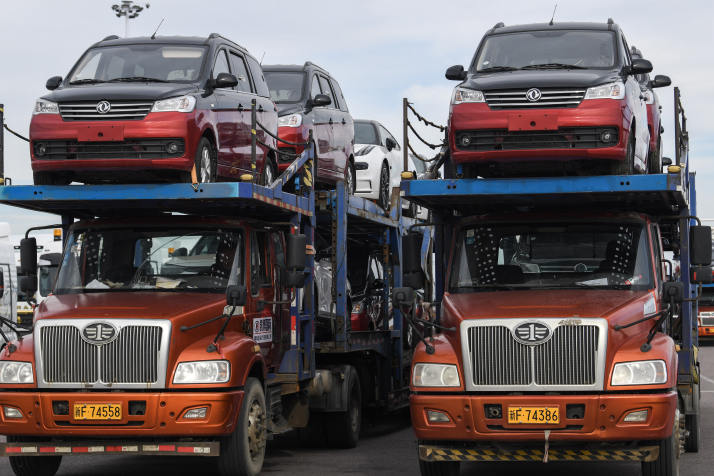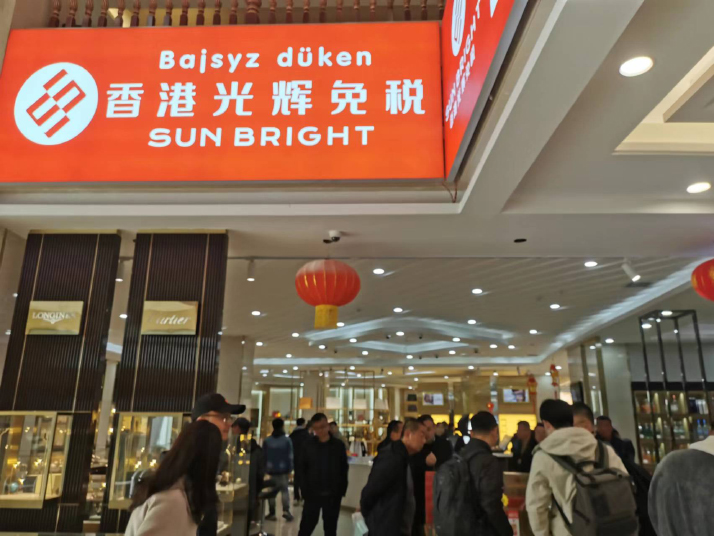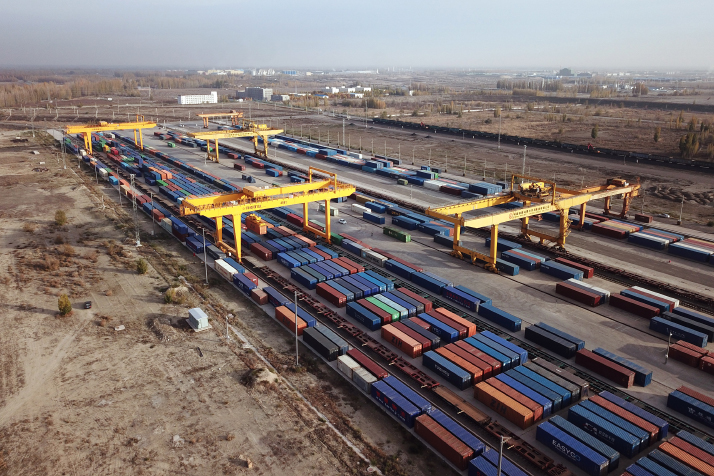| China |
| Old Xinjiang border pass gets a contemporary restyling | |
|
|
|
Tourists pose for pictures at the China-Kazakhstan Khorgas International Border Cooperation Center on November 8 (XINHUA) Trucker Guo Rui was waiting for customs clearance at the highway port in Khorgas, also known as Horgos, in Xinjiang Uygur Autonomous Region in northwest China. That was on November 7, when he was transporting domestically made cars to Kazakhstan. With the rapid development of China's automobile industry, overseas demand for Chinese cars is growing. To facilitate the export of domestic cars, Khorgas Customs has simplified related clearance procedures. Since October 4, more than 5,000 cars have been exported to Central Asian countries through the highway port. Domestic new-energy vehicles of Li Auto, BYD and Geely are proving particularly popular in Central Asia and Russia. "By booking customs clearance online, it has become faster to go through customs," Guo said, adding that in October, he had transported about 20 truckloads of cars, five to eight vehicles at a time. As of November 3, more than 100,000 cars had been exported through the Khorgas Highway Port this year, up 177.3 percent year on year, according to port data. Gu Haifeng, general manager of Khorgas Asia Europe Supply Chain Co. Ltd., where Guo works, told Beijing Review that he moved to the city from his home province of Zhejiang in east China to set up the company in April, taking into account Khorgas' geographical location and opening-up policy. Gu said the cars can pass through customs the same day they are declared to customs—a very swift process. A pivotal port In Mongolian, Khorgas means a place where camels pass, and in the Kazak language, it means a place where wealth is accumulated. The area is home to a number of ethnic groups. It was once a busy passage used by traders traveling along the ancient Silk Road. As a border pass, it dates back more than 140 years. Today, it is one of China's closest overland ports to Central Asia and Europe. The Belt and Road Initiative, proposed by China 10 years ago with the aim of strengthening connectivity along and beyond the ancient Silk Road routes, has given the old port a modern makeover. Since the first China-Europe freight train passed through Khorgas Railway Port in 2016, the number of such trains has increased from fewer than 700 to more than 7,000 last year, according to port data. Eighteen railway lines pass through the port to 18 countries, including Germany, Poland and Belgium, carrying more than 200 categories of cargo. The exported products include electronic products, clothes and cars. Goods imported through the port include agricultural products and food.  Automobiles wait to be exported at the Khorgas Highway Port in Xinjiang on September 6 (XINHUA)
Accumulating assets Today, the border city's increasingly convenient transportation and geographic location have attracted many people and businesses to accumulate wealth. Truck driver Salamat Abdilda makes seven to eight trips a month between his home in Almaty, Kazakhstan's most populous city, and Khorgas. Upon learning five years ago that there would be a fortune to be made in freight hauling, he began transporting clothing and daily necessities from Khorgas to his city. "In the beginning, I had to stay in Khorgas for 10 days to load goods and clear customs. Now, this only takes me two to three days," Abdilda told Beijing Review. He earns 30,000 yuan ($4,203) to 40,000 yuan ($5,604) a month transporting goods and has used the income to buy a car and build a new house. Russian food processing company Golden Katyusha set up shop in the city in 2016. The company has been included in the city's comprehensive bonded zone since the zone's establishment in 2020, becoming the first foreign company in the zone. The zone is a specially designated area under the supervision of Chinese customs and enjoys favorable tax policies. For instance, imported infrastructure materials and equipment are exempt from import duties and other related taxes. The company imports raw materials such as flour and rapeseed oil from Novosibirsk, Russia, and processes them into noodles, cooking oil and biscuits. Russian wheat flour and rapeseed oil are cheaper and known for their high quality, and are very popular with Chinese consumers, Iurii Basargin, the company's general manager, told Beijing Review. The relatively short distance between Novosibirsk and Khorgas and efficient customs procedures allow these materials to arrive in the zone within two days. This, combined with the favorable tax policies, makes Basargin confident about doing business in the city. Hu Chunmei, who is from Wenzhou in Zhejiang Province in east China, runs a duty-free shop selling imported cosmetics, jewelry and clothes at the China-Kazakhstan Khorgas International Border Cooperation Center in Khorgas, the first cross-border economic cooperation center between China and other countries established in 2012. The center covers an area of 5.6 square km, including 3.43 square km in China and 2.17 square km in Kazakhstan. Citizens of China and Kazakhstan do not need a visa to enter the center and can go in with a valid ID, such as a passport. Each person can purchase up to 8,000 yuan ($1,121) in duty-free goods per day at the center. Hu and her family used to run a supermarket chain in Italy, and in 2016 she noticed that some young Chinese were buying their products to sell to consumers in China. Realizing that China had a burgeoning market for imported products, she returned to China to sell imported products. Favorable tax policies and an advantageous geographic location were what attracted Hu to Khorgas in the first place. In 2017, she opened a store of more than 4,000 square meters in the center. The products she selected from Italy, France and Spain were transported to a warehouse in Germany before being shipped to China. Hu told Xinjiang Daily that in the beginning the goods were transported by air, costing more than 10 yuan ($1.4) per kg. Maritime transport cost less but took too long. Some food products would have expired by the time they arrived. As the number of China-Europe freight trains has increased in recent years, she has had her products shipped by train, which takes a maximum of two weeks and is much less expensive than air transport. The products Hu sells have expanded from shampoos, body wash and skincare products to Russian candies and camel milk powder from Kazakhstan.  A duty-free shop at the China-Kazakhstan Khorgas International Border Cooperation Center on November 8 (XINHUA)
Budding opportunities China approved setting up the China (Xinjiang) Pilot Free Trade Zone (FTZ) in a circular issued by the State Council, China's cabinet, on October 31. The FTZ, the first in China's northwestern border regions, officially started operations on November 1. FTZs in China are a type of special economic zone. Goods can be imported, processed, manufactured and exported without direct customs intervention. Each FTZ in China has a specific industrial and economic focus, with a different set of incentives designed to achieve its objectives. FTZ incentives and regulations are aligned with the ongoing policy priorities of the Chinese Government. Khorgas is one of the three areas included in the Xinjiang Pilot FTZ. According to the circular, the FTZ, composed of parts of Urumqi (the regional capital), Khorgas and Kashgar (another border city), covers a total area of 179.66 square km and will focus on emerging industries, labor-intensive industries and the modern service industry. The circular called for efforts to transform the zone into a demonstration model of high-quality development for the country's central and western regions.  Khorgas Railway Port in Xinjiang Uygur Autonomous Region on November 8 (XINHUA)
In the next three to five years, the zone will see significant progress in terms of business environment, convenient investment and trade, as well as clusters of advantageous industries with shared resources and effective management coordination. Wang Hongli, Deputy Director of the Economics Research Institute under the Xinjiang Academy of Social Sciences, told Chinanews.com that the Xinjiang Pilot FTZ is "a great opportunity for the autonomous region." The move will help expand the depth and scope of Xinjiang's opening up and, more importantly, will promote employment, increase incomes and improve local people's livelihoods. Wang said Xinjiang needs to learn from other FTZs in China and the world to improve its management efficiency, convenience of customs procedures, tax system and market environment. In the meantime, Xinjiang should improve its own economic strength based on its unique local advantages and participate in all kinds of regional free trade agreements to generate more trade opportunities. Zhu Hongjian, an official with the management committee of the Khorgas Comprehensive Bonded Zone, told Beijing Review that the FTZ will play a great role in facilitating trade, as well as in financial and personnel exchanges. Yu Chengzhong, Chairman of Jin Yi Group, an agricultural products trade company in Khorgas, told Beijing Review that the FTZ is expected to boost its trade with Central Asia and Russia, as more convenient and faster trade means a fresher taste of fruits and vegetables. "In Khorgas, we can feel the country opening up wider, and there are increasingly better policies and more opportunities for businesses," Yu said. (Reporting from Xinjiang Uygur Autonomous Region) (Print Edition: A Port oF Call) Copyedited by Elsbeth van Paridon Comments to jijing@cicgamericas.com |
|
||||||||||||||||||||||||||||
|
